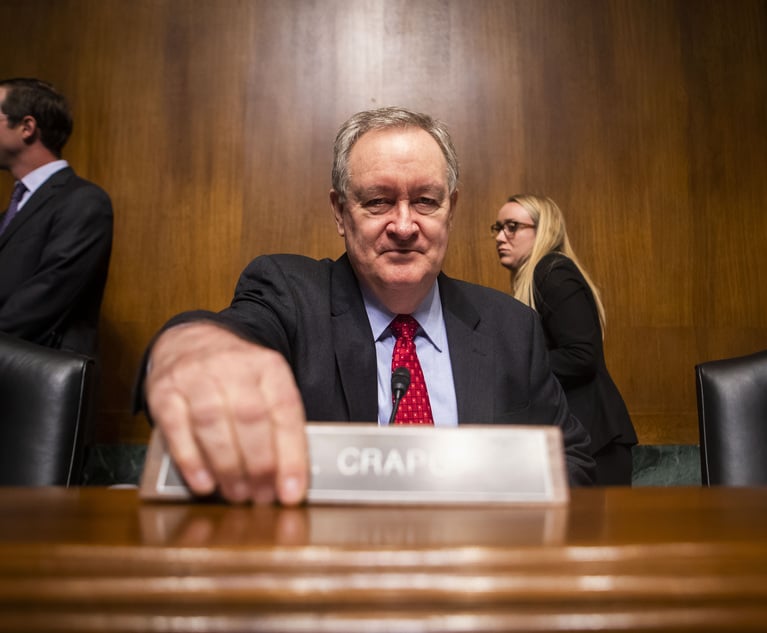Sidley Bows to Pressure on Mandatory Arbitration as DLA Piper Digs In
Sidley Austin pre-emptively nixed a requirement that associates and staff sign mandatory arbitration agreements. But despite a Harvard Law School group now launching a #DumpDLA campaign, DLA Piper is defending the practice.
November 28, 2018 at 02:50 PM
4 minute read
 Entrance gate into Harvard Yard at Harvard University in Cambridge, Massachusetts. (Photo: Roman Babakin/Shutterstock.com)
Entrance gate into Harvard Yard at Harvard University in Cambridge, Massachusetts. (Photo: Roman Babakin/Shutterstock.com)
Another Big Law firm is backing away from mandatory arbitration agreements for employees amid renewed pushback on the provisions from a Harvard Law School student group.
Sidley Austin said Wednesday that it will no longer require summer associates, associates or staff to sign mandatory arbitration agreements that prohibit them from suing over workplace issues such as harassment and discrimination.
Sidley's move goes further than Kirkland & Ellis, which last week dropped such agreements for summer associates and associates, but did not say it was abandoning the practice for staff. Kirkland was directly targeted by the Pipeline Parity Project, a coalition of Harvard law students that aims to end discrimination in the legal profession. Employing the Twitter hashtag #DumpKirkland, the group urged classmates to boycott the firm during the upcoming summer associate recruiting season unless it did away with mandatory arbitration, calling such agreements coercive.
Sidley's decision to follow suit is notable because it did not come under specific threat of a student boycott. The Pipeline Parity Project warned last week that it would target other firms using mandatory arbitration, but had not announced any action targeting Sidley.
“We're really pleased that firms like Sidley Austin recognize that dropping forced arbitration is the right thing to do for all of their employees,” said Pipeline Parity Project organizer Vail Kohnert-Yount in a statement announcing the change. “Hopefully, the lawyers at these firms will also rethink compelling these types of coercive contracts on behalf of their clients, because it's obvious that forced arbitration impedes access to justice.”
Sidley did not specify its reasons for ending mandatory arbitration in an announcement that the Pipeline Parity Project circulated on Twitter on Wednesday, saying only that it revised its policy. A Sidley spokesperson confirmed the change but did not provide further comment on the reason for the reversal.
Now leaders of the student group have already set their sights on DLA Piper, unleashing a new #DumpDLA campaign on Twitter the same day it scored a win with Sidley. Project leaders said in an announcement that the firm is requiring incoming summer associates to sign mandatory arbitration agreements.
“It's unclear why DLA Piper is still forcing arbitration agreements on their lawyers, summer associates, and likely also their non-lawyer staff,” the announcement reads. “Forced arbitration agreements effectively require employees to sign away their right to seek redress in court if they experience illegal treatment at work.”
The firm on Wednesday issued a statement justifying its use of mandatory arbitration.
“There are advantages and disadvantages to every type of dispute resolution process,” the statement reads. “It has been our experience as a firm that arbitration is a fair and efficient way to resolve internal disputes, and one that benefits all parties in what are often sensitive matters for everyone involved.”
Like Kirkland and Sidley, DLA Piper did not respond to a survey that students from 14 elite law school circulated last spring, seeking to determine the extent of mandatory arbitration agreements for summer associates in Big Law and legal organizations. Fewer than half of the surveyed firms and organizations submitted responses, and the Pipeline Parity Project has urged law students to stay away from firms that either said they use those agreements or that do not disclose their policies.
The movement against mandatory arbitration took shape in March when a Harvard lecturer revealed that Munger, Tolles & Olson required summer associates to sign them. The firm quickly reversed course after an outcry among students.
Read More:
Not Everyone Cheers Kirkland's Move to End Associate Arbitration Policy
This content has been archived. It is available through our partners, LexisNexis® and Bloomberg Law.
To view this content, please continue to their sites.
Not a Lexis Subscriber?
Subscribe Now
Not a Bloomberg Law Subscriber?
Subscribe Now
NOT FOR REPRINT
© 2025 ALM Global, LLC, All Rights Reserved. Request academic re-use from www.copyright.com. All other uses, submit a request to [email protected]. For more information visit Asset & Logo Licensing.
You Might Like
View All

Goodwin Procter Relocates to Renewable-Powered Office in San Francisco’s Financial District

Greenberg Traurig Combines Digital Infrastructure and Real Estate Groups, Anticipating Uptick in Demand
4 minute read
Senator Plans to Reintroduce Bill to Split 9th Circuit
Trending Stories
- 15th Circuit Considers Challenge to Louisiana's Ten Commandments Law
- 2Crocs Accused of Padding Revenue With Channel-Stuffing HEYDUDE Shoes
- 3E-discovery Practitioners Are Racing to Adapt to Social Media’s Evolving Landscape
- 4The Law Firm Disrupted: For Office Policies, Big Law Has Its Ear to the Market, Not to Trump
- 5FTC Finalizes Child Online Privacy Rule Updates, But Ferguson Eyes Further Changes
Who Got The Work
J. Brugh Lower of Gibbons has entered an appearance for industrial equipment supplier Devco Corporation in a pending trademark infringement lawsuit. The suit, accusing the defendant of selling knock-off Graco products, was filed Dec. 18 in New Jersey District Court by Rivkin Radler on behalf of Graco Inc. and Graco Minnesota. The case, assigned to U.S. District Judge Zahid N. Quraishi, is 3:24-cv-11294, Graco Inc. et al v. Devco Corporation.
Who Got The Work
Rebecca Maller-Stein and Kent A. Yalowitz of Arnold & Porter Kaye Scholer have entered their appearances for Hanaco Venture Capital and its executives, Lior Prosor and David Frankel, in a pending securities lawsuit. The action, filed on Dec. 24 in New York Southern District Court by Zell, Aron & Co. on behalf of Goldeneye Advisors, accuses the defendants of negligently and fraudulently managing the plaintiff's $1 million investment. The case, assigned to U.S. District Judge Vernon S. Broderick, is 1:24-cv-09918, Goldeneye Advisors, LLC v. Hanaco Venture Capital, Ltd. et al.
Who Got The Work
Attorneys from A&O Shearman has stepped in as defense counsel for Toronto-Dominion Bank and other defendants in a pending securities class action. The suit, filed Dec. 11 in New York Southern District Court by Bleichmar Fonti & Auld, accuses the defendants of concealing the bank's 'pervasive' deficiencies in regards to its compliance with the Bank Secrecy Act and the quality of its anti-money laundering controls. The case, assigned to U.S. District Judge Arun Subramanian, is 1:24-cv-09445, Gonzalez v. The Toronto-Dominion Bank et al.
Who Got The Work
Crown Castle International, a Pennsylvania company providing shared communications infrastructure, has turned to Luke D. Wolf of Gordon Rees Scully Mansukhani to fend off a pending breach-of-contract lawsuit. The court action, filed Nov. 25 in Michigan Eastern District Court by Hooper Hathaway PC on behalf of The Town Residences LLC, accuses Crown Castle of failing to transfer approximately $30,000 in utility payments from T-Mobile in breach of a roof-top lease and assignment agreement. The case, assigned to U.S. District Judge Susan K. Declercq, is 2:24-cv-13131, The Town Residences LLC v. T-Mobile US, Inc. et al.
Who Got The Work
Wilfred P. Coronato and Daniel M. Schwartz of McCarter & English have stepped in as defense counsel to Electrolux Home Products Inc. in a pending product liability lawsuit. The court action, filed Nov. 26 in New York Eastern District Court by Poulos Lopiccolo PC and Nagel Rice LLP on behalf of David Stern, alleges that the defendant's refrigerators’ drawers and shelving repeatedly break and fall apart within months after purchase. The case, assigned to U.S. District Judge Joan M. Azrack, is 2:24-cv-08204, Stern v. Electrolux Home Products, Inc.
Featured Firms
Law Offices of Gary Martin Hays & Associates, P.C.
(470) 294-1674
Law Offices of Mark E. Salomone
(857) 444-6468
Smith & Hassler
(713) 739-1250








